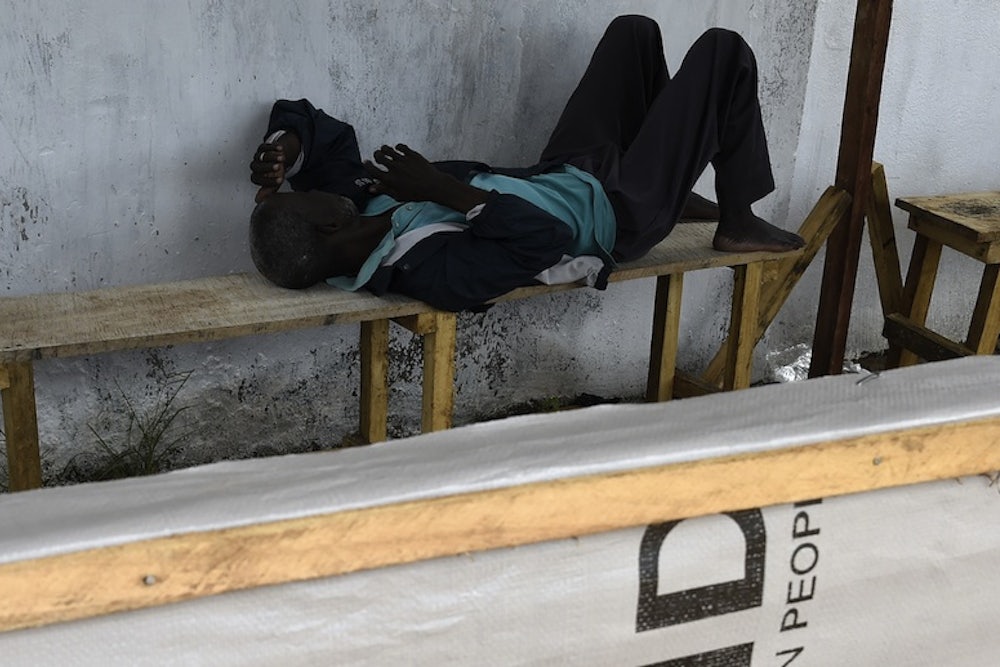It “focuses on Africa, and largely ignores our own borders.” Those are the words Republican Senator David Vitter used this week, in a letter objecting to President Obama’s plan for fighting the Ebola epidemic.
I don’t think it’s the first time an Administration critic has used such a description. It certainly won’t be the last. And that’s troubling, because Africa is precisely where the focus should be.
Vitter’s letter went to leaders of the Senate Appropriations and Armed Services Committees, both of whom must sign off on the Administration’s request to redirect $1 billion of existing defense spending. In the letter, Vitter said the Administration had not sufficiently briefed Congress on how it intends to spend the money—and he demanded, as he has before, the Administration take more aggressive action to keep potentially dangerous travelers out of the U.S.
Are those particular criticisms persuasive? I'm skeptical, though I can't say for certain. The Administration has already provided classified briefings to the relevant committees. House Republican leaders apparently found those briefings sufficient, since they have given their assent. As for more aggressive action to keep out travelers from affected countries, public health experts have said such measures would be counter-productive, because they would hinder relief efforts. But members of Congress certainly have the right to exercise their oversight authority aggressively. Questions about traveler scrutiny are ones over which reasonable people can disagree, and even change their minds.
The Ebola’s plan’s emphasis on Africa is another matter entirely. As of October 8, according to the U.S. Centers for Disease Control, there were more than 8000 reported cases of Ebola in Africa and nearly 4000 deaths. The toll will almost certainly rise quickly. Projections suggest that caseloads could get into the hundreds of thousands, or even over a million, by next year. The Secretary-General of the United Nations said on Thursday that the region needs twenty times the aid it’s getting in order to get the epidemic under control. In the U.S., meanwhile, there’s still been just one reported case—and that was somebody who got the disease in Africa. Unlike countries like Liberia and Sierra Leone, the U.S. has the infrastructure to treat and contain the disease, even if a handful of more cases appear here.
It takes no great effort to show that it’s in the self-interest of Americans to help fight Ebola overseas. The interconnected world makes truly sealing borders difficult; the more the disease spreads through Africa, the more likely cases are likely to find their way to places outside the continent. Meanwhile, the World Bank said on Thursday that Ebola could inflict more than $32 billion of economic damage on West Africa by the end of next year. That’s bound to make the region even more vulnerable to future epidemics and more hospitable to civil unrest. Both problems have a way of affecting neighboring countries, and eventually the rest of the world.
But put aside the practical justifications and listen to Ernest Bai Koroma, the president of Sierra Leone. “Our people are dying,” he said on Thursday, describing Ebola as “a tragedy unforeseen in modern times.” That should be reason enough to help—and to do so as quickly as possible.
—Jonathan Cohn
News from Thursday:
VOTING RIGHTS: The non-partisan Government Accountability Office has a new report on Voter ID laws. Sure enough, they reduce turnout rates for blacks, college students, and young people. Kevin Drum has the key chart. (Mother Jones)
POLICE AND RACE: Another black teenager has been shot by a white police officer in the St. Louis area. The circumstances of the killing aren’t clear. Police say the boy fired upon them, while the boy’s parents say he was unarmed. The incident set off new protests and clashes. (Alan Blinder, New York Times)
OBAMACARE: Insurers are exploiting a loophole in the Affordable Care Act to hit some consumers with extra charges on preventative services. (Ann Doss Helms, Charlotte Observer and Kaiser Health News)
Articles worth reading
Grit matters more than IQ: Researchers think non-cognitive skills, like persistence and patience, are the real keys to success. But, Libby Nelson explains, nobody is sure how to teach that. (Vox)
Scolding the deficit scolds: The deficit keeps coming down, so both Jonathan Chait and Paul Krugman want to know why budget hawks aren’t happier about it. (New York, the New York Times)
The new Keystone: Worried they won’t be able to ship their oil south to the Gulf of Mexico, Canadian fossil fuel companies are trying to build a pipeline that will take their product east to the Atlantic. (Bloomberg)
The Four Questions: Actually it’s five, and Jason Millman is asking them about Obamacare’s next open enrollment period, which begins in November. (Wonkblog)
Statistic of the day: According to a new Pew poll, one in four Americans blame inequality in America on poor people being lazy (Roberto Ferdman, Washington Post)
Stories we’ll be watching
There’s not much happening. Maybe it’s a good day to pay attention to congressional campaigns.
At QED
Ignore the haters, Danny Vinik says. Obama’s record on the economy is actually quite good. Elsewhere at the New Republic, Jeffrey Ball warns that it’s already too late to limit global warming to two degrees Celsius, as advocates have long urged. And in the print magazine’s new cover story, Franklin Foer says that Amazon.com has become an economic menace. He wants to break up the company.
